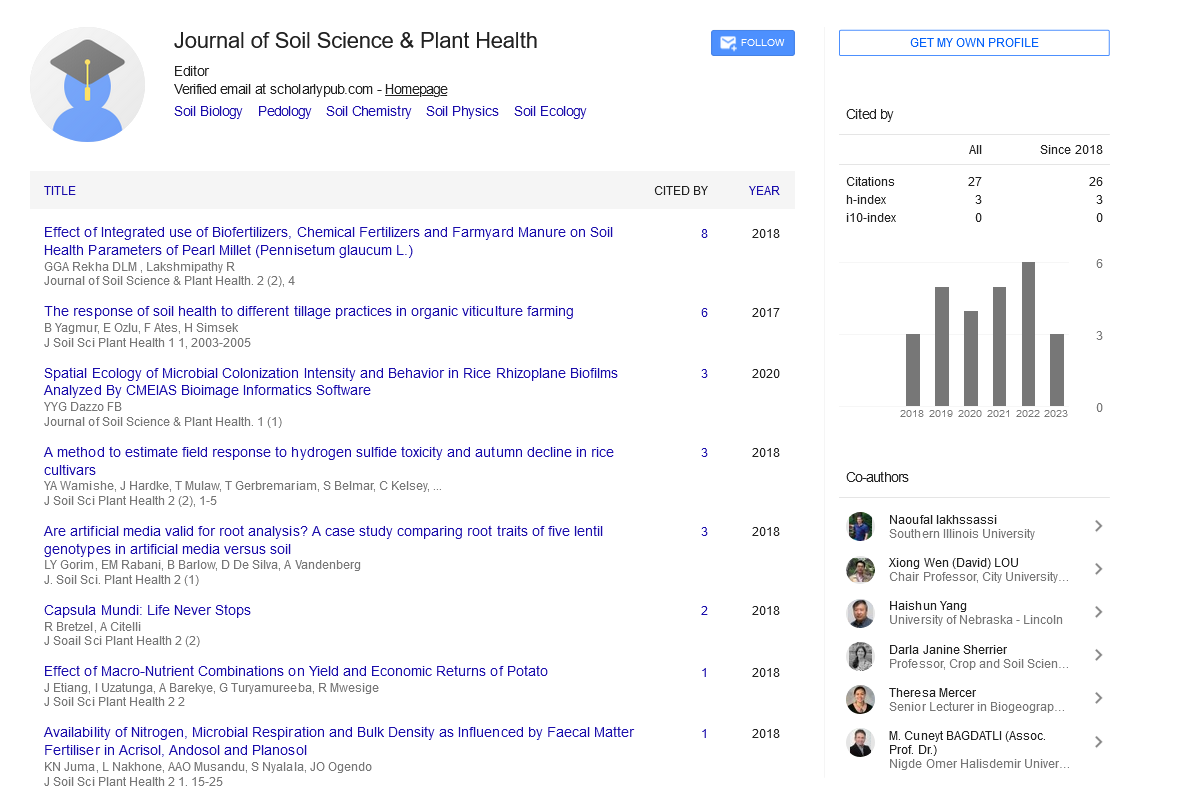Commentary, J Soil Sci Plant Health Vol: 8 Issue: 1
The Role of Rhizosphere Microbes Enhancing Plant Health and Immunity
Sang Kook*
Department of Agriculture and Biotechnology, Huazhong Agricultural University, No. 1 Shizishan Street, Hongshan District, Wuhan 430070, Hubei Province, China
- *Corresponding Author:
- Sang Kook
Department of Agriculture and Biotechnology,
Huazhong Agricultural University,
No. 1 Shizishan Street,
Hongshan District,
Wuhan 430070,
Hubei Province,
China
E-mail: jimin23@gmail.com
Received date: 27 October, 2023, Manuscript No. JSPH-23-118482;
Editor assigned date: 30 October, 2023, PreQC No. JSPH-23-118482 (PQ);
Reviewed date: 13 November, 2023, QC No. JSPH-23-118482;
Revised date: 05 January, 2024, Manuscript No. JSPH-23-118482 (R);
Published date: 12 January, 2024, DOI: 10.4172/jsph.1000221
Citation: Kook S (2024) The Role of Rhizosphere Microbes Enhancing Plant Health and Immunity. J Soil Sci Plant Health J 8:1.
Description
In the complex and dynamic world of plant-microbe interactions, the rhizosphere, the soil region surrounding plant roots, emerges as a hotspot of activity. Within the rhizosphere, an intricate web of interactions occurs, influencing plant health, growth, and resistance to pathogens. While above-ground mechanisms of plant immunity have been extensively studied, the role of rhizosphere microbes in plant defense has gained recognition as a critical component of plant immunity. The multifaceted relationship between plants and rhizosphere microbes, shedding light on the significant role these microorganisms play in enhancing plant health and immunity.
The rhizosphere is teeming with microorganisms, including bacteria, fungi, archaea, and protozoa. It serves as the interface between the plant root system and the soil environment, making it a vital zone for nutrient exchange and complex interactions. Key features of the rhizosphere microenvironment include:
Plants release a variety of organic compounds, including sugars, amino acids, and secondary metabolites, into the rhizosphere, shaping the microbial community and influencing their activities.
The rhizosphere is enriched with organic carbon, nutrients, and other substances that support microbial growth and metabolic activity.
The rhizosphere hosts a diverse microbial community, which plays a critical role in nutrient cycling and overall soil health.
The diversity of rhizosphere microbes can significantly impact plant health and immunity. This diversity, in turn, can be influenced by plant species, root exudates, and environmental conditions. Key aspects of microbial diversity and plant health include:
Some rhizosphere microbes are known to suppress soil-borne pathogens, either directly through antagonistic activities or indirectly by priming the plant's immune system.
Microbes in the rhizosphere play a vital role in nutrient cycling, making essential nutrients available to plants and enhancing their growth.
Certain rhizosphere microbes can act as biological control agents against plant diseases, reducing the need for chemical interventions.
Variations in the composition of the rhizosphere microbiome can affect plant disease susceptibility and immune responses.
The role of rhizosphere microbes in plant immunity is multifaceted and involves several key mechanisms:
Rhizosphere microbes, particularly Plant Growth-Promoting Rhizobacteria (PGPR), can induce systemic resistance in plants. This process involves the activation of plant defense mechanisms, enhancing resistance to a broad spectrum of pathogens.
Some rhizosphere microbes can directly inhibit the growth and activity of plant pathogens in the soil, reducing their impact on the plant.
Rhizosphere microbes can prime the plant's immune system, enabling a faster and more effective response when a pathogen is encountered.
Microbes in the rhizosphere can influence the plant's hormonal signaling pathways, regulating immune responses and systemic resistance.
Environmental factors, including soil type, land management practices, and climate, can significantly affect the composition and function of rhizosphere microbes. These factors influence the dynamics of plant-microbe interactions and plant immunity.
While the role of rhizosphere microbes in plant immunity is increasingly recognized, several challenges and avenues for future research remain: Developing strategies to manipulate the rhizosphere microbial community to enhance plant immunity is a complex and evolving field.
Ensuring that plant-microbe interactions are environmentally sustainable and do not have unintended consequences is a crucial consideration.
Translating the findings of laboratory research into practical, fieldscale applications is an ongoing challenge.
Conclusion
The rhizosphere, a dynamic and diverse microbial hub, plays a significant role in shaping plant immunity and enhancing plant health. Rhizosphere microbes interact with plant roots, influencing nutrient cycling, disease suppression, and the plant's immune responses. As our understanding of these intricate plant-microbe interactions continues to expand, it offers new opportunities for sustainable agriculture and enhanced plant health through the manipulation of rhizosphere microbiomes. Harnessing the potential of rhizosphere microbes in plant immunity is a promising avenue for addressing the challenges of modern agriculture and ensuring food security for a growing global population.
 Spanish
Spanish  Chinese
Chinese  Russian
Russian  German
German  French
French  Japanese
Japanese  Portuguese
Portuguese  Hindi
Hindi 